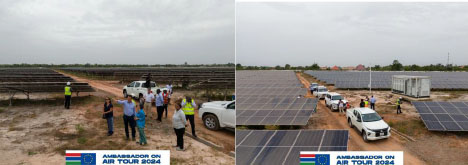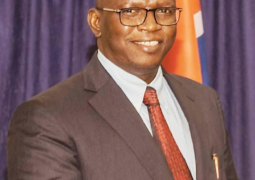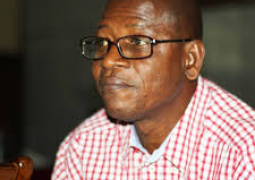
It was on a Monday afternoon, and the new EU Ambassador Immaculada Roca i Cortés arrived at the solar plant around mid day, accompanied by EU Delegation officials. It was a usual sunny Gambian day, and her visit formed part of her tour of EU funded projects across the country. This is Day 1, and the NAWEC deputy managing director, Edrisa Jarjue; its generation manager, Edward Jatta, among other project officials, received and led the diplomat on a conducted tour of the facility.
This project, totalling approximately €140 million, has over a 100 million Euros funding from the European Union: €41 million as grant, €63 million as loan from the European Investment Bank, while another €36 million is funded by the World Bank.
Ambassador Roca I Cortés stated: “Energy is a basic human need that we all need for our daily lives. Access to affordable and reliable energy is also one of the key drivers for development. Indeed, businesses like people need energy at a decent price and in sufficient quantity.
“The EU accompanies The Gambia in numerous sectors from job creation to agriculture, governance or education. Providing access to clean and sustainable energy is also at the very heart of our development cooperation strategy: we are supporting a green, sustainable, social and economic development of The Gambia,” she added.
The Jambur solar plant will increase the generation capacity through an on-grid utility-scale solar photovoltaic (PV) plant with a total installed capacity of up to 20 MW (large-scale grid-connected solar PV system), including an associated battery energy storage station. It is a technology that converts sunlight directly into electricity using semiconductor materials.
A second component of the 100 million Euros project is to increase transmission and distribution capacity by reinforcing and expanding the national grid and prepare for its connection to the regional power system, improve security of supply, reduce technical losses and increase its renewable energy up-take capacity.
A third component is an on-grid and off-grid PV/battery systems installation, operation and maintenance for up to 1,100 schools and health facilities which are currently not connected to a reliable electricity system, especially in remote areas of the country.
“This solar plant will include a significant amount of Technical Assistance to prepare the grounds for its implementation,” Mr Edward Jatta, generation manager explained during the visit.
“Transmission lines for Gambia are not available, and this continues to be a major problem for the distribution network. It is why the 33Kilo Volt lines are undergoing replacement to ensure power stability and quality transmission,” deputy managing director, Edrisa Jarjue outlined. “It leads to losses in 20 percent of generated power,” he added.
Yesterday, the cost of electricity in the Gambia, one of the highest on the world, has a potential to be cheaper when solar energy potential is leveraged.
Other reasons attributed to the country’s high costs of electricity is attributed to the independent power producers (IPP) who are selling power to NAWEC at higher prices than the national power company was originally charging to consumers. The cost of thermal power production, relying on fossil fuels and generating carbon emissions are high and unsustainable to NAWEC.
“But solar is cheaper, cleaner and more sustainable,” they assured the Ambassador.
The EU ambassador is thrilled to witness these transformations undertaken in The Gambia, happy that EU funds are made available in support of the country’s development aspirations. Ambassador Roca i Cortés underlined the importance for NAWEC, implementing the project, to ensure it is managed in a sustainable way, reminding, in addition, that transparency is key both for the citizens in The Gambia and for European tax payers to display that funds are utilised appropriately.
Off Grid Platforms
Earlier in the day, Ambassador Roca I Cortés visited the Mbolo training academy, supported by the EU, in Tujereng, to learn first-hand about the incredible work in training young women into solar energy experts in installation and maintenance of solar power in The Gambia.
Mbolo/Fandema chairman, Mr Malang Sambu and staff members received the diplomat, took her on a conducted tour of their facilities in the coastal village. What began with a little over a dozen students, this academy has bloomed into a corps of 700 trainees within 15 years, thanks to the vision of the co-founder, Malang Sambu, who studied solar engineering in Europe and returned home to establish Mbolo/Fandema.
It is a story of revolution: hundreds of women have undergone a thorough training in renewable energy, a vocational training that is empowering these young women. Some of the graduates have gone further to obtain a national diploma in tertiary institutions and university degrees outside the country.
An example of their work was also visited in Kartong, where a Solar Expansion (12 kWp system) was installed, powering an ice plant and the solar multifunctional platform (SMFP) to increase the ice production. The project later was expanded to include a cold store, and a food preservation storage facility that benefits not just fishers but also horticulturists in the coastal village.
Similar platforms have been established in communities that are not connected to national power supply network, where Mbolo trainees installed and maintained solar energy systems for community use.
After this first day, ambassador Imma Roca i Cortés carried on the visit upcountry with a sense of achievement and humbled by the concrete daily commitments of EU partners on the ground who contribute in making a change in people’s life.




